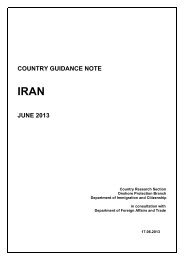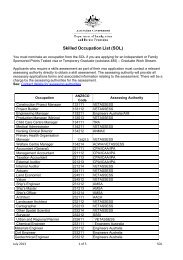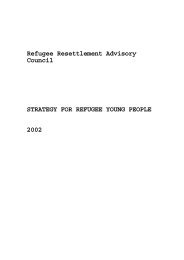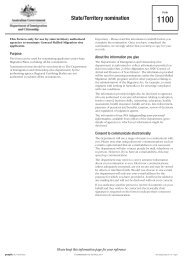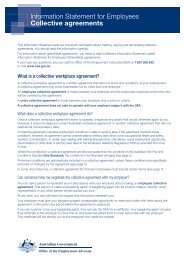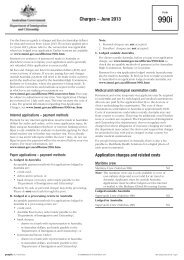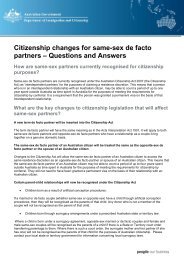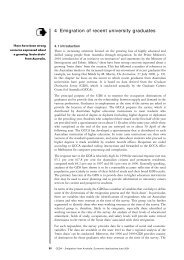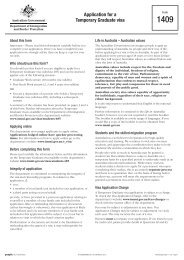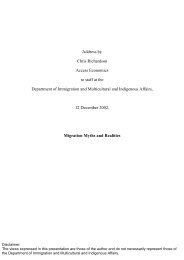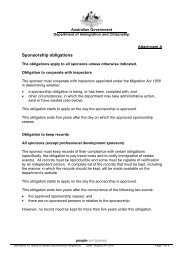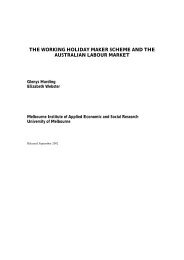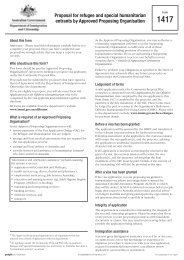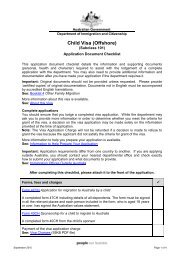Evaluation of the Integrated Humanitarian Settlement Strategy (IHSS)
Evaluation of the Integrated Humanitarian Settlement Strategy (IHSS)
Evaluation of the Integrated Humanitarian Settlement Strategy (IHSS)
You also want an ePaper? Increase the reach of your titles
YUMPU automatically turns print PDFs into web optimized ePapers that Google loves.
4.2 Role and use <strong>of</strong> volunteers<br />
A key intention <strong>of</strong> <strong>the</strong> <strong>IHSS</strong> service model was to ensure that volunteers were able to contribute<br />
effectively to <strong>the</strong> settlement <strong>of</strong> new entrants while <strong>of</strong>fering <strong>the</strong>m greater flexibility, both in how <strong>the</strong>y<br />
assisted entrants and in <strong>the</strong> level <strong>of</strong> <strong>the</strong>ir involvement. Under <strong>the</strong> <strong>IHSS</strong>, volunteers contribute by<br />
registering as a member <strong>of</strong> a CSR group and/or by working directly with <strong>IHSS</strong> service providers.<br />
In practice, this has meant that many volunteers who were previously involved in CRSS groups have<br />
registered with CSR groups, although <strong>the</strong>re is also a significant number <strong>of</strong> new groups. O<strong>the</strong>rs work<br />
directly with <strong>IHSS</strong> providers. In some cases <strong>the</strong>y have joined an already well established pool <strong>of</strong><br />
volunteers attached to <strong>the</strong> provider. Although both CSR and non CSR groups may work with <strong>IHSS</strong><br />
clients, <strong>the</strong>y are managed differently and are responsible to different organisations. CSR groups are<br />
registered by DIMIA and are coordinated by a CSR coordinator in each State as part <strong>of</strong> <strong>the</strong> SSP. In<br />
effect <strong>the</strong>re are two parallel systems, with <strong>the</strong> CSR groups attached to DIMIA and supported by an<br />
external organisation and o<strong>the</strong>r volunteers who may or may not be CSR volunteers directly recruited<br />
and managed by <strong>IHSS</strong> service providers.<br />
At <strong>the</strong> time <strong>the</strong> fieldwork was conducted for this evaluation, <strong>the</strong> CSR service was not fully<br />
implemented. State/Territory coordinators, recruited by <strong>the</strong> national SSP, had only just taken up <strong>the</strong>ir<br />
jobs in some States and recruitment was still underway for <strong>the</strong> remainder.<br />
The involvement and use <strong>of</strong> volunteers varies between States/Territories and between service<br />
providers. Most commonly, service providers enlist <strong>the</strong> help <strong>of</strong> volunteers for tasks that are time and<br />
labour intensive, such as airport ‘meet and greet’ on arrival, accompanying clients to medical<br />
appointments and ongoing support and friendship. A few service providers seek <strong>the</strong> assistance <strong>of</strong><br />
o<strong>the</strong>r recent entrants to welcome newer entrants as <strong>the</strong>y are able to interpret and explain different<br />
cultural expectations, ensure culturally appropriate food preparation and help with grocery shopping<br />
and welcoming activities. However volunteers are also involved to some degree in <strong>the</strong> delivery <strong>of</strong> all<br />
contracted services. Tasks undertaken by both CSR and o<strong>the</strong>r volunteers included assistance with<br />
opening bank accounts, registering with Centrelink and Medicare, obtaining health assessments<br />
through <strong>the</strong> EHAI service provider and helping children and adults start English language classes. At<br />
least two providers deliver much <strong>of</strong> <strong>the</strong>ir services using volunteers.<br />
A number <strong>of</strong> service providers reported that <strong>the</strong>y would be unable to fulfil <strong>the</strong>ir obligations without<br />
volunteer assistance. As one CSR volunteer said, ‘We’re <strong>the</strong>re 24 hours a day, whereas <strong>the</strong> workers<br />
are only <strong>the</strong>re at set times.’<br />
In some cases volunteers provide intensive support when families simply cannot cope.<br />
Some families need a lot more support than o<strong>the</strong>rs. We had one totally dysfunctional<br />
family that required constant assistance for months and months and months, and just as<br />
we’d thought we’d sorted out one problem, ano<strong>the</strong>r would crop up, and that’s extremely<br />
demanding and we had to seek a lot <strong>of</strong> pr<strong>of</strong>essional help.<br />
(CSR Volunteer group)<br />
Some providers said <strong>the</strong>y tend to use a small number <strong>of</strong> ‘tried and tested’ volunteers, because <strong>the</strong>y<br />
know <strong>the</strong>ir capacities and ability to provide support.<br />
22<br />
<strong>Evaluation</strong> <strong>of</strong> <strong>the</strong> <strong>Integrated</strong> <strong>Humanitarian</strong> <strong>Settlement</strong> <strong>Strategy</strong> 27 May 2003



